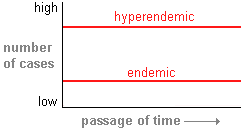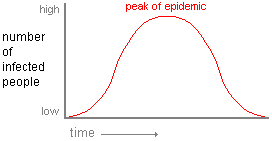Glossary of Terms
A B C D E F G H I J K L M N O P Q R S T U V W X Y Z
Select the first letter of the word you are seeking from the list above
to jump to the appropriate section of the glossary or scroll down to it
- A -
-
acupuncture

-
AIDS

- Acquired Immune Deficiency Syndrome. This is the last stage of the disease caused by HIV. The immune system fails to function adequately and the patient usually succumbs to cancer, pneumonia, or other serious diseases.
-
autoimmune disease

- a disorder of an individual's immune system which causes it to attack his or her own organs or tissues. Rheumatoid arthritis, insulin-dependent diabetes, and lupus erythematosus are examples. The symptoms of allergies are also autoimmune disorders but are triggered by external stimuli. The serious autoimmune diseases are more common in women than in men.
Back to Top
- B -
-
bewitching

- using magical acts and/or the assistance of supernatural beings to cause something to occur. Bewitching is an integral part of witchcraft.
Back to Top
- C -
- cholera

- a severe bacterial infection in the intestines that causes profuse diarrhea and vomiting. It results in rapid dehydration and death if not aggressively treated by rehydration and antibiotics. The bacteria responsible for this disease (Vibrio cholerae) usually enters the body by drinking contaminated water.
- contagious
magic

- magic that is based on the principle that things or persons once in contact can afterward influence each other. In other words, there is a permanent relationship between an individual and any part of his or her body. As a consequence, believers must take special precautions with their hair, fingernails, teeth, clothes, and feces. If anyone obtained these objects, magic could be performed on them which would cause the person they came from to be affected.
- culture bound syndrome
- a disease that has a very limited distribution around the world due to the unique sets of environmental circumstances and cultural practices that cause it to occur. koro, kuru, and Widigo psychosis are examples.
-
curandero
 (female: curandera
(female: curandera
 )
) - a Latin American folk curer.
Cuanderos believe that they
have received a divine calling to their profession, and they may have
direct contact with the spirit world. They usually apprentice for
years under an older curandero. In Mexico and Central
America, there are curandero generalists and specialists.
Yerberos
 are knowledgeable about herbs. Parteras
are knowledgeable about herbs. Parteras
 are midwifes. Sabadoros
are midwifes. Sabadoros
 are specialists in massaging patients.
Curanderos may also specialize in particular kinds of
illness--e.g., curandero de aire
are specialists in massaging patients.
Curanderos may also specialize in particular kinds of
illness--e.g., curandero de aire
 ,
etc.
,
etc.
Back to Top
- D -
- a nation that is relatively wealthy and usually industrialized. Most of the people in developed nations have adequate access to food, electricity, fossil fuels, education, and medicine with the consequence that their lives are materially more comfortable and their life spans are significantly longer than those in underdeveloped nation. The United States, Canada, most of Europe, Japan, Korea, Taiwan, Singapore, Australia, and New Zealand are developed nations.
- disease vector
- an intermediate host and/or disease transmitting organism for a contagious disease. Mosquitoes, fleas, lice, ticks, flies, and even snails are common disease vectors.
-
divination

- a magical procedure by which the cause of a particular event or the future is determined.
-
dysentery

- a severe bacterial or amoebic infection of the intestines which results in frequent diarrhea (sometimes with blood and mucus), abdominal pain, and fatigue. The bacterial form of dysentery is usually rapid and severe in the onset of symptoms causing significant dehydration. In contrast, the amoebic form usually develops more slowly and becomes chronic. Treatment usually includes drugs to stop diarrhea as well as antibiotics and/or toxins to kill the bacteria or amoebas. If not treated, amoebic dysentery can eventually result in death.
Back to Top
- E -
 |
endemic 
-
a disease that is always present in a community, usually at a low, more or less constant frequency. Malaria, arthritis, and high blood pressure are examples. See hyperendemic.
epidemic 
 |
- a disease that is usually highly contagious but is not always present in a community. Epidemic diseases appear, rise rapidly in the number of cases, and then decline or even disappear. Measles, influenza, and the plague are examples of epidemic diseases. They usually appear seasonally as a result of changing human interaction patterns and changes in the environment. See pandemic.
epidemiology 
- the field of medical research that studies the causes of diseases and how to cure or control them. Epidemiologists also track the frequency and geographic distribution of diseases over time. In addition, they study the causal relationships between diseases.
ethnocentrism

- the feeling that your own group's cultural traditions and values are correct and superior to all others. This is usually coupled with a generalized dislike and even contempt for people who have other cultural traditions. Ethnocentrism is universal in that all people around the world are ethnocentric to some degree.
ethnopharmacology

- the scientific study of traditional uses of plants and other organisms for medical purposes. Ethnopharmacology is a specialization within ethnobiology, which is an interdisciplinary field of research carried out by people trained in cultural anthropology, biology, and medicine.
Back to Top
- F -
Back to Top
- G -
Back to Top
- H -
- HIV

Human Immunodeficiency Virus. This is a class of viruses that can cause AIDS. It is spread from person to person via blood transfusions, blood products, sexual intercourse, and breast milk. HIV is a retrovirus, which is to say there usually is a delay of years between acquiring the virus and the first symptoms of AIDS.
-
humoral pathology

a naturalistic medical system based on the idea that our bodies have four important fluids or humors--blood, phlegm, black bile, and yellow bile. Each humor is thought to have its own "complexion." Blood is hot and wet. Phlegm is cold and wet. Black bile is cold and dry. Yellow bile is hot and dry. These complexions have nothing to do with actual temperature and humidity. In addition to bodily fluids, three internal organs are considered highly important in humoral pathology. Each one has its own characteristic complexion. The heart is dry and cold. The brain is wet and cold. The liver is hot and wet. Specific forms of illnesses, medicines, foods, and most natural objects also have specific complexions. Curing an illness involves discovering the complexion imbalance and rectifying it.
-
hyperendemic

an endemic disease present at a continuously high frequency within a population.
- hypothesis

a tentative explanation for a set of observable or measurable facts that is tested using the scientific method.